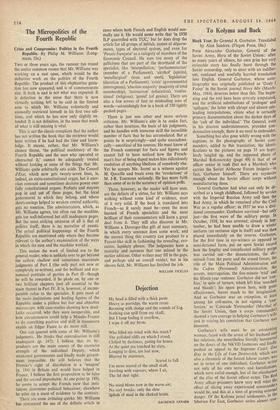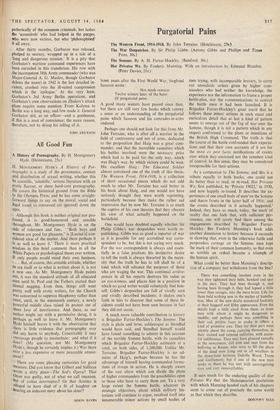To Kolyma and Back
POOR Alexander Gorbatov, General of the Soviet Army, Hero of the Soviet Union: after so many years of silence, his own grim but very estimable story has finally burst through the Soviet censorship, only to meet with an indiffer-
ent, confused and woefully hurried translation into English. General Gorbatov, whose auto- biography was originally published as 'Gody Voiny' in the Soviet journal Novy Mir (March- May, 1964), deserves better than this. The begin-
ning and the end have been severely amputated, and the artificial substitutions of 'prologue' and 'epilogue,' the latter with abrupt and almost mis- leading interpolations, vitiate what is certainly primary documentation about the darker days of the 'cult of the individual.' The General, even in his discreet understatements, provides con- demnation enough; there is no need to embroider.
Something has also gone wildly wrong with the captions to the photographs of Soviet com- manders, added to this translation; the identi- fications to the pictures on page 33 are hope- lessly tangled up, and the supposed photo of Marshal Rokossovsky (page 49) is that of an officer senior in rank (but not a Marshal) who carries the Soviet Airborne Forces insignia—in fact, Gorbatov himself. There are mysteries enough about the Soviet officer corps without manufacturing them.
General Gorbatov had what can only be de- scribed as a tough childhood, followed by service with the Imperial Russian Army anti then the Red Army, in which he remained after the Civil War as a regular officer; in 1937 he was a divi- sional commander. Gorbatov survived—but only just—the first wave of the military purge. In October, 1938, he was arrested; already in Sep- tember, he had been unable to draw a winter uniform (an ominous sign in itself) and was then placed immediately on the reserve. Gorbatov, for the first time in eye-witness as opposed to semi-fictional form, put on open Soviet record how the lengthy and complicated military purge was carried out—the denunciations, the dis- missals from the party and the armed forces, the role of the Main Political Administration and the Cadres (Personnel) Administration, the, arrests, interrogation, the five-minute 'trial' and the fifteen-year sentence. Gorbatov did not 'con- fess,' in spite of torture, which left him 'smashed and bloody': his spare prose here, with great effectiveness, leaves much to the imagination. And as Gorbatov was an exception, at least among his cell-mates, in not signing a 'con' fession,' so 'Comrade Yeremenko' (Marshal of the Soviet Union, then a corps commander) showed a rare courage in helping Gorbatov's wife and in voicing his conviction that Gorbatov Was innocent.
Gorbatov's wife must be an astonishing woman; faced with the arrest of her husband and her relatives, she nevertheless literally hammerV on the doors of the NKVD fastnesses and finallY pushed an appeal to the Supreme Court. One Day in the Life of Ivan Denisovich, which Vi" also a chronicle of the forced labour camps, Was set in terms of one individual; Gorbatov writes not only of his own terrors and humiliations, which were awful enough, but of the elimination of the elite of the Soviet officer corps. The Red Army officer-prisoners knew very well what the effect of slicing away experienced commander would be, and this at a time of growing external danger. Of the Kolyma penal settlements, in the Siberian Far East, Gorbatov writes almost synr • pathetically of the common criminals, but lashes " the 'scoundrels' who had helped in the purges, who were now victims, but who 'philosophised' it all away.
After thirty months, Gorbatov was released, pledged to secrecy, wrapped up in a tale of a 'long and dangerous mission.' It is a pity that Gorbatov's wartime command experiences have been curtailed in this translation. His row with the incompetent 38th Army commander (who was Major-General A. G. Maslov, though Gorbatov • deletes the name) in 1942 is the last detailed in- cident, crushed into the ill-suited compression Which is the 'epilogue.' At the very least, Gorbatov's 3rd Army Berlin operations, and Gorbatov's own observations on Zhukov's attack • plans require some mention. From Kolyma to Berlin was a long way, and few made it. General Gorbatov did, as an officer—and a gentleman, if this is a man of conscience; the more reason, therefore, not to skimp his telling of it.
JOHN ERICKSON





























 Previous page
Previous page